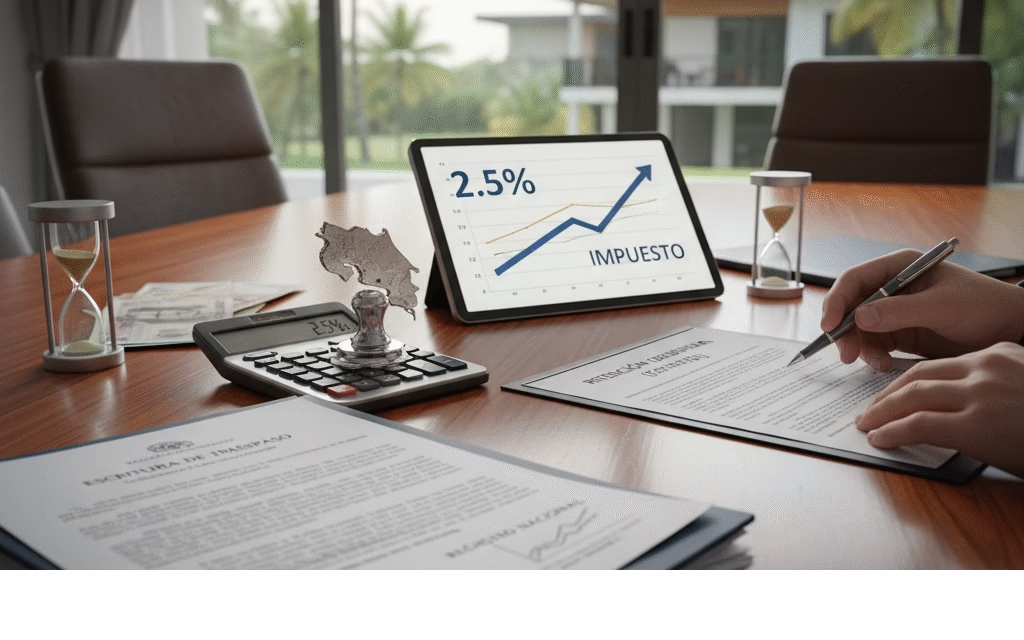Costa Rica Capital Gains Tax for Foreigners: The Buyer’s 2.5% Withholding Guide

The Law That Made Buyers the Tax Police
For years, the Costa Rican real estate market was simple: the seller paid their taxes, and the buyer acquired the title. But with the introduction of the Capital Gains Tax (CGT) and recent tax resolutions, particularly Article 28 ter of the Income Tax Law (Law 7092), a major change has occurred for properties sold by non-resident sellers.
Now, the buyer is legally responsible for acting as the Withholding Agent. While this may sound complex, it is a mechanism designed to increase compliance, prevent tax evasion, and most importantly protect your property transaction from future complications.
Who Is Affected? (The Non-Resident Seller)
This law applies only when the seller is considered a non-resident of Costa Rica.
That classification typically includes:
- An individual who spends fewer than 183 days per year in Costa Rica.
- A foreign legal entity, trust, or offshore company that owns the property.
Important: If a property is held by an active Costa Rican corporation (sociedad anónima or SRL) registered with the tax authorities, it is typically considered domiciled and not subject to this withholding rule. Always confirm the seller’s tax status with your attorney.
The Core Rule: Withhold 2.5% of the Gross Sale Price
If you are buying property from a non-resident seller, you, the buyer, must withhold 2.5% of the total sale price and remit it to the Costa Rican Tax Authority (Dirección General de Tributación, or “Hacienda”).
This 2.5% is not the seller’s total tax liability. It is an advance payment (credit) toward their final capital gains tax calculation.
| What Is Withheld? | 2.5% of the total sale price |
|---|---|
| Who Withholds? | The Buyer (as Withholding Agent) |
| Who Receives the Payment? | Dirección General de Tributación (Hacienda) |
Buyer Compliance: The Four-Step Closing Checklist
When your closing is managed by a qualified notary public and escrow agent, here is how compliance works:
1. Identify the Seller’s Status
Your legal team verifies whether the seller is an official resident or non-resident. This determines if the 2.5% withholding applies.
2. Fund the Escrow and Apply the Withholding
The full purchase amount is deposited into escrow. Under the notary’s guidance, 2.5% is deducted from the funds due to the seller and held aside for tax remittance.
3. File the Declaration and Remit the Payment
The buyer (or their attorney) must:
- File Form 129 – Retenciones de Ganancias de Capital – No Domiciliado through the TRIBU-CR digital platform.
- Pay the withheld 2.5% to Hacienda.
- Complete this process within the first 15 calendar days of the month following the sale.
4. Register the Deed at the National Registry
Once fully implemented, the National Registry will not register a transfer until Hacienda confirms that the withholding has been declared and paid. Although this enforcement is still being phased in at the time of this post, buyers should assume it will soon be mandatory. Proper compliance is essential to avoid delays in title registration.
What Happens to the Seller?
The seller receives an official receipt showing the 2.5% tax withheld and can use it as a credit toward their final capital gains tax return.
- Final Capital Gains Tax: 15% of the net profit (Sale Price – Acquisition Cost – Approved Improvements).
- If the 2.5% withheld exceeds the seller’s final tax due, the seller can apply for a refund from Hacienda.
- If it is less, the seller must pay the balance.
Special Option: The 2.25% Rule
For sellers who purchased their property before July 1, 2019, the law allows a one-time alternative: pay a flat 2.25% of the total sale price instead of 15% on net gains.
In these cases, the 2.5% withholding typically covers or slightly exceeds the seller’s tax liability, simplifying the process.
Why This Matters for Buyers in the Central Pacific
If you are purchasing real estate in Costa Rica, including our zone of specialty of Jacó, Herradura, Playa Blanca, and Punta Leona, the 2.5% withholding rule is a small technical detail with major consequences if ignored.
Failure to comply can lead to:
- Delayed closings or rejection of title registration.
- Fines and penalties for the buyer.
- Loss of legal protection over the transfer.
Working with an experienced real estate broker and a qualified legal team ensures your transaction remains compliant, efficient, and secure.
What Buyers Should Do Before Closing
- Confirm the seller’s residency status early in the process.
- Ensure your notary and escrow agent clearly outline withholding in the closing documents.
- File Form 129 and remit payment through TRIBU-CR on time.
- Retain all receipts and confirmation numbers for your records.
Navigating Real Estate Closings with Confidence
At Pura Vida Real Estate & Rentals, we specialize in guiding international buyers and sellers through every legal and financial detail of real estate transactions along Costa Rica’s Central Pacific, covering Jacó, Playa Blanca, Herradura, Los Sueños, and Punta Leona.
Whether you are purchasing your dream vacation home or selling an investment property, our team ensures your closing is smooth, compliant, and 100% secure.sellers through this process, ensuring secure and compliant closings every time.

